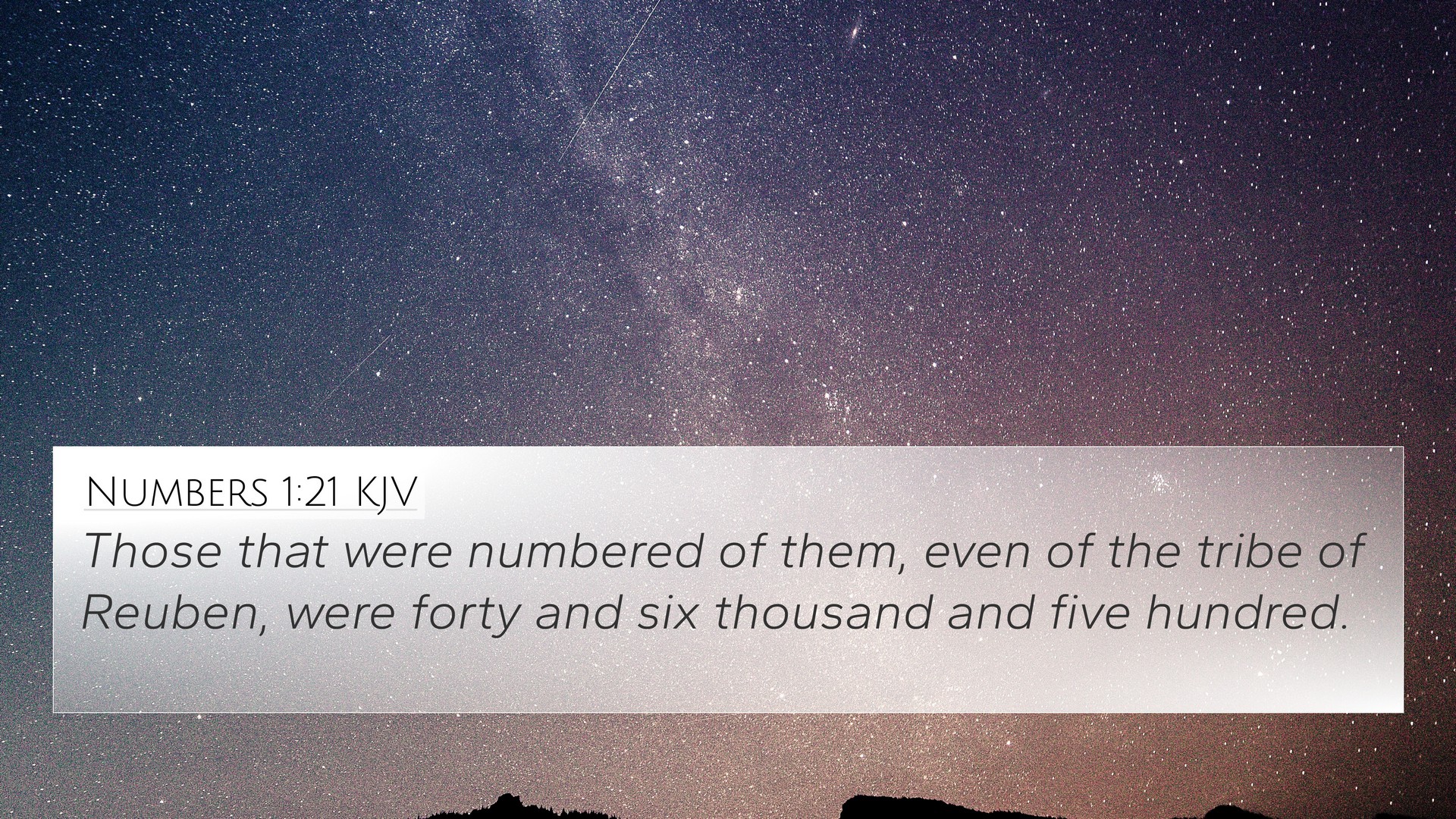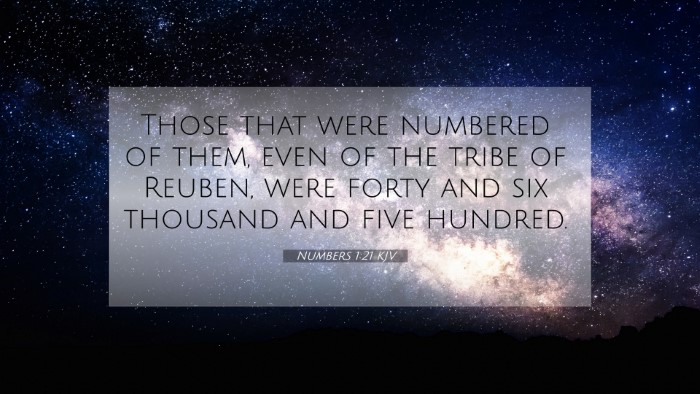Understanding Numbers 1:21
Numbers 1:21 states: "Those that were numbered of them, even of the tribe of Reuben, were forty and six thousand and five hundred."
This verse is part of a census conducted in the wilderness at the command of God, specifically focusing on the tribe of Reuben. The number recorded shows the size and strength of this tribe, which provides insights into their role in Israel's journey.
Insights from Public Domain Commentaries
The interpretations from well-known public domain commentaries like those by Matthew Henry, Albert Barnes, and Adam Clarke offer a multi-faceted understanding of this verse.
Matthew Henry's Commentary
Matthew Henry emphasizes that the numbering of the Israelites was not merely an exercise in counting but a divine command that served multiple purposes.
- Demonstrating God's care: The detailed numbering reveals God's concern for each tribe and individual.
- Preparing for warfare: Understanding the strength of each tribe was crucial for military preparations.
- Establishing order: This act helped organize the tribes for their journey and future battles.
Albert Barnes' Commentary
Albert Barnes adds that the specifics of the census indicate God’s intention to provide for His people and ensure they were accounted for.
- Tribe of Reuben's significance: Being the firstborn, Reuben had a prominent position among the tribes.
- Numbers signify life: The enumeration signifies vitality and readiness among the people of Israel.
- God’s judgment: Those who survived from the earlier generations were the ones who were obedient to God's commands.
Adam Clarke's Commentary
Adam Clarke discusses the historical context, noting that such a census was customary for ancient societies to assert their strength.
- Political importance: This census had socio-political implications, showcasing the tribe's power and future role.
- Symbol of divine approval: Reuben's number was indicative of God's favor or disfavor toward the nation.
- Lessons for future generations: The record serves as a reminder of God’s faithfulness and the importance of each individual.
Bible Cross-References
The verse connects with various other scripture passages that highlight themes of accountability, divine purpose, and the role of different tribes within Israel:
- Exodus 30:12: A similar census concept is established for the purpose of atonement.
- Numbers 26:5-7: A subsequent census shows the continuity of tribal lineage and God's plan.
- 1 Chronicles 5:1-2: Discussing the birthright of Reuben and its implications.
- Genesis 49:3-4: Jacob's blessing on Reuben highlights his noble position and shortcomings.
- Exodus 1:5: Reference to Israel's initial population before entering Egypt, impacting the census.
- 1 Peter 2:9: The concept of a chosen people is echoed in the New Testament, connecting believers to the Israelites.
- Hebrews 11:22: Faith of the patriarchs, relating back to their lineage and God's promises.
Thematic Connections
This verse highlights significant themes that resonate throughout the Scriptures.
- Covenant and Promise: The number of the tribes symbolizes God's faithfulness to His covenant with Abraham.
- Identity of God’s People: Understanding one’s origins and numbers reassures the children of Israel of their identity as God’s chosen people.
- Order and Structure in God's Kingdom: God’s meticulous enumeration emphasizes the need for order and structure in the community that serves Him.
Tools for Bible Cross-Referencing
To deepen understanding and analysis of biblical connections, here are some tools and methods for effective cross-referencing:
- Bible Concordance: A reference tool to locate keywords and phrases within the biblical text.
- Bible Cross-Reference Guide: A guide to see relationships and parallels between verses.
- Cross-referencing Bible Study: Structured methods to explore how verses relate thematically and contextually.
- Bible Reference Resources: Books and online tools that allow for in-depth research and study.
- Citing Inter-Biblical Dialogue: Recognizing conversations between Old and New Testament themes enriches understanding.
Conclusion
Numbers 1:21 serves as more than a historical record; it brings to light the overarching narrative of God’s faithful dealings with His people. By utilizing cross-references and understanding the theological implications within this verse, we can glean rich insights into the importance of identity, accountability, and divine oversight present throughout the scriptures.




